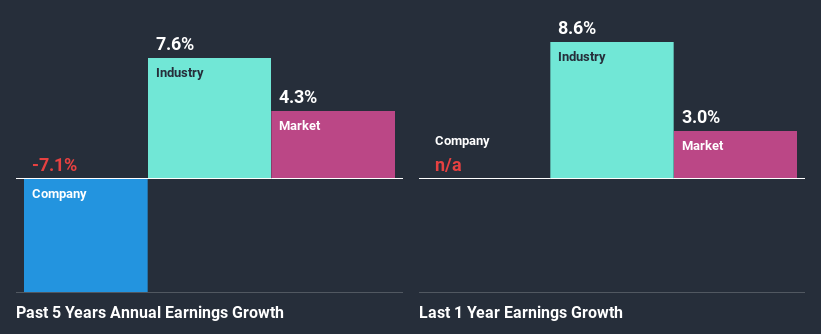- South Korea
- /
- Chemicals
- /
- KOSE:A002100
Does Kyung Nong Corporation's (KRX:002100) Weak Fundamentals Mean That The Market Could Correct Its Share Price?
Kyung Nong (KRX:002100) has had a great run on the share market with its stock up by a significant 11% over the last three months. However, in this article, we decided to focus on its weak fundamentals, as long-term financial performance of a business is what ultimatley dictates market outcomes. Particularly, we will be paying attention to Kyung Nong's ROE today.
Return on equity or ROE is a key measure used to assess how efficiently a company's management is utilizing the company's capital. Simply put, it is used to assess the profitability of a company in relation to its equity capital.
Check out our latest analysis for Kyung Nong
How Do You Calculate Return On Equity?
The formula for return on equity is:
Return on Equity = Net Profit (from continuing operations) ÷ Shareholders' Equity
So, based on the above formula, the ROE for Kyung Nong is:
5.2% = ₩11b ÷ ₩215b (Based on the trailing twelve months to September 2020).
The 'return' is the amount earned after tax over the last twelve months. One way to conceptualize this is that for each ₩1 of shareholders' capital it has, the company made ₩0.05 in profit.
What Has ROE Got To Do With Earnings Growth?
Thus far, we have learned that ROE measures how efficiently a company is generating its profits. We now need to evaluate how much profit the company reinvests or "retains" for future growth which then gives us an idea about the growth potential of the company. Generally speaking, other things being equal, firms with a high return on equity and profit retention, have a higher growth rate than firms that don’t share these attributes.
A Side By Side comparison of Kyung Nong's Earnings Growth And 5.2% ROE
It is quite clear that Kyung Nong's ROE is rather low. Not just that, even compared to the industry average of 8.2%, the company's ROE is entirely unremarkable. For this reason, Kyung Nong's five year net income decline of 7.1% is not surprising given its lower ROE. However, there could also be other factors causing the earnings to decline. For instance, the company has a very high payout ratio, or is faced with competitive pressures.
So, as a next step, we compared Kyung Nong's performance against the industry and were disappointed to discover that while the company has been shrinking its earnings, the industry has been growing its earnings at a rate of 7.6% in the same period.

Earnings growth is a huge factor in stock valuation. The investor should try to establish if the expected growth or decline in earnings, whichever the case may be, is priced in. Doing so will help them establish if the stock's future looks promising or ominous. If you're wondering about Kyung Nong's's valuation, check out this gauge of its price-to-earnings ratio, as compared to its industry.
Is Kyung Nong Efficiently Re-investing Its Profits?
With a high three-year median payout ratio of 63% (implying that 37% of the profits are retained), most of Kyung Nong's profits are being paid to shareholders, which explains the company's shrinking earnings. With only a little being reinvested into the business, earnings growth would obviously be low or non-existent. To know the 3 risks we have identified for Kyung Nong visit our risks dashboard for free.
In addition, Kyung Nong has been paying dividends over a period of at least ten years suggesting that keeping up dividend payments is way more important to the management even if it comes at the cost of business growth.
Conclusion
On the whole, Kyung Nong's performance is quite a big let-down. Because the company is not reinvesting much into the business, and given the low ROE, it's not surprising to see the lack or absence of growth in its earnings. Until now, we have only just grazed the surface of the company's past performance by looking at the company's fundamentals. You can do your own research on Kyung Nong and see how it has performed in the past by looking at this FREE detailed graph of past earnings, revenue and cash flows.
If you decide to trade Kyung Nong, use the lowest-cost* platform that is rated #1 Overall by Barron’s, Interactive Brokers. Trade stocks, options, futures, forex, bonds and funds on 135 markets, all from a single integrated account. Promoted
Valuation is complex, but we're here to simplify it.
Discover if Kyung Nong might be undervalued or overvalued with our detailed analysis, featuring fair value estimates, potential risks, dividends, insider trades, and its financial condition.
Access Free AnalysisThis article by Simply Wall St is general in nature. It does not constitute a recommendation to buy or sell any stock, and does not take account of your objectives, or your financial situation. We aim to bring you long-term focused analysis driven by fundamental data. Note that our analysis may not factor in the latest price-sensitive company announcements or qualitative material. Simply Wall St has no position in any stocks mentioned.
*Interactive Brokers Rated Lowest Cost Broker by StockBrokers.com Annual Online Review 2020
Have feedback on this article? Concerned about the content? Get in touch with us directly. Alternatively, email editorial-team (at) simplywallst.com.
About KOSE:A002100
Kyung Nong
Engages in the manufacture and sale of agricultural chemicals in South Korea.
Adequate balance sheet average dividend payer.
Market Insights
Community Narratives



